“So, what do you do?”
I’m pretty certain that this is the most common opening line between working professionals.
Business is an overlay for social interactions, not the other way around.
Back to my original point, though, of the small talk interactions of first meeting someone, and how I’ve been able to modify the experience. Indy Hall, as an experience, provides a relatively clean slate for human interactions in a still familiar business context. When I notice a new member (or perhaps just a new face that I haven’t had a chance to meet before), the intuition might be to ask that person,“So, what do you do?”
The fact is, by the time they’re on our membership roster, I can look that information up, but that’s not the point. Realizing that was the case, though, provided me with the opportunity to come up with a new question.“So, how’d you find out about Indy Hall?”
This seems like a question that only the founder or business owner would care about, but I’ve noticed something. A slightly different question often leads me to the same answer of the question “So, what do you do?”, but through a much more interesting path that provides more context for a potential relationship and human connection than the chance that me and that person have the same or similar professions.“So, how’d you find out about Indy Hall?”
This provides me with foundational information on that person, what’s important to them, if we have any common relationships, what their interest in Indy Hall might be, and other more human commonalities than our professions.Answer: “My friend _______ told me about it….”
This piece of information tells me who we know in common. I pay a lot of attention to my social networks, and rely on them heavily for behavior patterns. If we have common friends, we now have an opportunity to talk about how we know those people. Perhaps we’ve even been at the same events/parties/experiences in the past, and again, we have more things to talk about besides the superficialness of our work. I can also potentially utilize my social networks to do a little more reconnaissance on that person through other people that I already know and trust.Answer: “I read about it in __________….”
Now I have a little bit of information about what kinds of sources you go to for news and information. This is generally interesting, and if it happens to be a source that I also read, I can turn the attention to other interesting topics or articles for us to discuss. This lets us get to know each other in the context of current events, understand what kinds of topics are of interest and importance to each other, and provides an opportunity to learn from each other. I’ve found that learning from another person is an extremely valuable, low cost transaction that has immense long term payoff in business and social settings.Answer: “I was going crazy working from home/cafes/etc…”
It doesn’t really answer the question, but I’m pretty sure this is the most common answer to the question. The cool thing about this response is the opportunity to connect on a very basic, “Yeah, I hear you. That’s how this whole things started!”.The highest form a civilization can reach is a seamless web of deserved trust. Not much procedure, just totally reliable people correctly trusting one another.We’re not just talking about business, here. We’re talking about making improvements to society.
 I am always thinking about the intersection of people, relationships, trust and business. I founded
I am always thinking about the intersection of people, relationships, trust and business. I founded